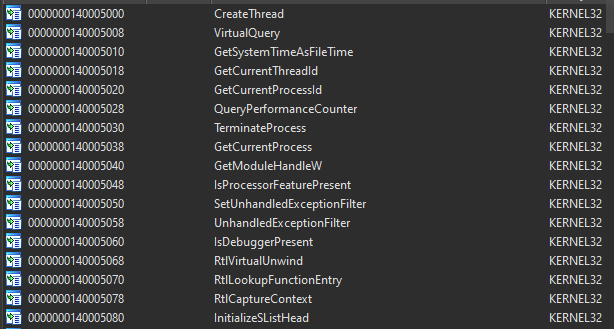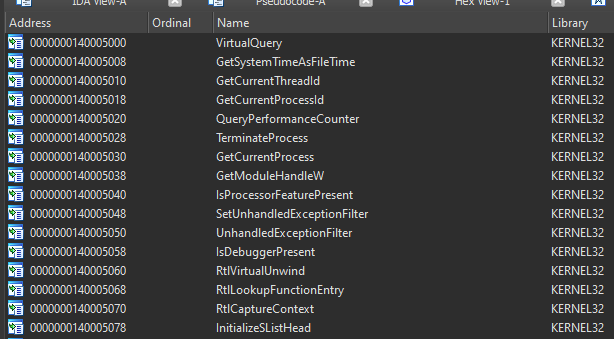importer is a tiny tool designed to dodge reverse engineers that i coded for use later in larger project.
This little friend saves you from the burden of defining the function template while importing the internal function you need, as you can see in Example.cpp. Also, this tool is very useful for those who want to use functions as hidden on import table based on simple reason. At the compile time, compiler cant solve your execution of target. In this case, i advice use compile time string obfuscation methods as like https://github.com/adamyaxley/Obfuscate. The tool also supports compile-time string obfuscation, which further increases the difficulty for reverse engineers to understand the code.
In general, it is planned to be used for undocumented and user mode definitions, aka value nt and zw functions.
You can call these functions without using WinAPI functions like GetProcAddress, GetModuleHandle thanks to CustomAPI.
Our usage should have been like this:
HANDLE hThread;
typedef NTSTATUS(NTAPI* NtQueryInformationThread_t)(HANDLE, LONG, PVOID, ULONG, PULONG);
uint64_t hNtdll = GetModuleHandleA("ntdll.dll");
NtQueryInformationThread_t NtQueryInformationThread = (NtQueryInformationThread_t)GetProcAddress(hNtdll, "NtQueryInformationThread");
NTSTATUS ntStat = 0;
DWORD_PTR dwStartAddress = 0;
ntStat = NtQueryInformationThread(hThread, 9, &dwStartAddress, sizeof(dwStartAddress), NULL);With the importer it will be like this:
HANDLE hThread;
NTSTATUS ntStat = 0;
DWORD_PTR dwStartAddress = 0;
auto exportNtdll = ii::Importer("ntdll.dll");
ntStat = exportNtdll.Invoke<NTSTATUS>("NtQueryInformationThread")(hThread, 9, &dwStartAddress, sizeof(dwStartAddress), NULL);As you can see on our Example.cpp we used CreateThread function for creating new thread.
Without Importer, our import table view would be like this:
With Importer, our import table view will be like this:
int __cdecl main(int argc, const char **argv, const char **envp)
{
HANDLE v3; // rbx
__int64 v4; // rax
__int64 v5; // rax
v3 = CreateThread(0i64, 0i64, StartAddress, 0i64, 0, 0i64);
v4 = sub_1400012F0(std::cout, "CreateThread returned: ");
v5 = std::ostream::operator<<(v4, v3);
std::ostream::operator<<(v5, sub_140001B50);
return getchar();
}Disassembled pseudo code of main function with ii-importer and without compile time string obfuscation
int __cdecl main(int argc, const char **argv, const char **envp)
{
__int64 v3; // rdx
unsigned __int64 i; // rcx
__int64 v5; // rbx
__int64 v6; // rdi
__int64 v7; // rax
__int64 v8; // rbx
__int64 v9; // rax
__int64 v10; // rax
__int64 v12; // rbx
__int64 v13; // rax
__int64 v14; // rax
__int64 pExceptionObject[4]; // [rsp+30h] [rbp-E8h] BYREF
char v16[32]; // [rsp+50h] [rbp-C8h] BYREF
char v17[8]; // [rsp+70h] [rbp-A8h] BYREF
__int64 v18; // [rsp+78h] [rbp-A0h]
__int64 v19; // [rsp+88h] [rbp-90h]
__int64 v20; // [rsp+A0h] [rbp-78h]
char v21[16]; // [rsp+B0h] [rbp-68h] BYREF
char v22[32]; // [rsp+C0h] [rbp-58h] BYREF
char v23[32]; // [rsp+E0h] [rbp-38h] BYREF
pExceptionObject[0] = (__int64)"Kernel32.dll";
pExceptionObject[1] = 12i64;
sub_140001DD0(v16, pExceptionObject, envp);
v3 = 0xCBF29CE484222325ui64;
for ( i = 0i64; i < 0xC; ++i )
v3 = 0x100000001B3i64 * ((unsigned __int8)aCreatethread[i] ^ (unsigned __int64)v3);
v5 = *(_QWORD *)(v19 + 16 * (v3 & v20) + 8);
if ( v5 == v18 )
{
LABEL_9:
v5 = 0i64;
}
else
{
v6 = *(_QWORD *)(v19 + 16 * (v3 & v20));
while ( *(_QWORD *)(v5 + 24) != 12i64 || memcmp("CreateThread", *(const void **)(v5 + 16), 0xCui64) )
{
if ( v5 == v6 )
goto LABEL_9;
v5 = *(_QWORD *)(v5 + 8);
}
}
v7 = v18;
if ( v5 )
v7 = v5;
if ( v7 == v18 )
{
v12 = sub_1400033B0(v21);
v13 = sub_1400015A0(v22);
v14 = sub_1400014C0(v23, v13, v12);
sub_140002310(pExceptionObject, v14);
CxxThrowException(pExceptionObject, (_ThrowInfo *)&_TI2_AVruntime_error_std__);
}
v8 = (*(__int64 (__fastcall **)(_QWORD, _QWORD, void (__fastcall __noreturn *)(), _QWORD, _QWORD, _QWORD))(v7 + 32))(
0i64,
0i64,
sub_140002980,
0i64,
0i64,
0i64);
v9 = sub_1400012F0(std::cout, "CreateThread returned: ");
v10 = std::ostream::operator<<(v9, v8);
std::ostream::operator<<(v10, sub_140001B50);
LODWORD(v8) = getchar();
sub_140002390(v17);
return v8;
}int __cdecl main(int argc, const char **argv, const char **envp)
{
__int64 v3; // r14
int v4; // eax
_DWORD *v5; // rbx
size_t v6; // rsi
__int64 v7; // rax
__int64 v8; // r8
int v9; // eax
_BYTE *v10; // rbx
__int64 v11; // rdx
size_t i; // rcx
__int64 v13; // rdi
__int64 v14; // r15
__int64 v15; // rax
__int64 v16; // rdi
__int64 v17; // r8
__m128i v18; // xmm0
int v19; // eax
__m128i *v20; // rbx
__int64 v21; // rax
__int64 v22; // rax
int v23; // ebx
__int64 v25; // rdi
__int64 v26; // rax
__int64 v27; // rax
char v28[32]; // [rsp+30h] [rbp-89h] BYREF
char v29[8]; // [rsp+50h] [rbp-69h] BYREF
__int64 v30; // [rsp+58h] [rbp-61h]
__int64 v31; // [rsp+68h] [rbp-51h]
__int64 v32; // [rsp+80h] [rbp-39h]
char v33[16]; // [rsp+90h] [rbp-29h] BYREF
__int64 pExceptionObject[2]; // [rsp+A0h] [rbp-19h] BYREF
__int64 v35; // [rsp+B0h] [rbp-9h] BYREF
char v36[32]; // [rsp+B8h] [rbp-1h] BYREF
char v37[32]; // [rsp+D8h] [rbp+1Fh] BYREF
v3 = *((_QWORD *)NtCurrentTeb()->ThreadLocalStoragePointer + (unsigned int)TlsIndex);
v4 = *(_DWORD *)(v3 + 120);
v5 = (_DWORD *)(v3 + 104);
if ( (v4 & 1) == 0 )
{
*(_DWORD *)(v3 + 120) = v4 | 1;
*(_DWORD *)(v3 + 114) = 28437901;
*v5 = -275562842;
*(_DWORD *)(v3 + 108) = 1306575316;
*(_WORD *)(v3 + 112) = 16323;
_tlregdtor(qword_140004FA0, argv, envp);
}
if ( *(_BYTE *)(v3 + 117) )
{
*(_BYTE *)v5 ^= 0xEDu;
*(_BYTE *)(v3 + 105) ^= 0x5Bu;
*(_BYTE *)(v3 + 106) ^= 0xE1u;
*(_BYTE *)(v3 + 107) ^= 0x81u;
*(_BYTE *)(v3 + 108) ^= 0xB1u;
*(_BYTE *)(v3 + 109) ^= 0xADu;
*(_BYTE *)(v3 + 110) ^= 0xD3u;
*(_BYTE *)(v3 + 111) ^= 0x7Fu;
*(_BYTE *)(v3 + 112) ^= 0xEDu;
*(_BYTE *)(v3 + 113) ^= 0x5Bu;
*(_BYTE *)(v3 + 114) ^= 0xE1u;
*(_BYTE *)(v3 + 115) ^= 0x81u;
*(_BYTE *)(v3 + 116) ^= 0xB1u;
*(_BYTE *)(v3 + 117) = 0;
}
pExceptionObject[0] = v3 + 104;
v6 = -1i64;
v7 = -1i64;
do
++v7;
while ( *((_BYTE *)v5 + v7) );
pExceptionObject[1] = v7;
sub_140001DD0(v28, pExceptionObject, envp);
v9 = *(_DWORD *)(v3 + 144);
if ( (v9 & 1) != 0 )
{
v10 = (_BYTE *)(v3 + 128);
}
else
{
*(_DWORD *)(v3 + 144) = v9 | 1;
v10 = (_BYTE *)(v3 + 128);
*(_DWORD *)(v3 + 138) = 27855640;
*(_DWORD *)(v3 + 128) = 236773648;
*(_DWORD *)(v3 + 132) = -371746595;
*(_WORD *)(v3 + 136) = -2527;
_tlregdtor(qword_140004FD0, 128i64, v8);
}
if ( v10[13] )
{
*v10 ^= 0x53u;
v10[1] ^= 0x93u;
v10[2] ^= 0x79u;
v10[3] ^= 0x6Fu;
v10[4] ^= 0xA9u;
v10[5] ^= 0xFDu;
v10[6] ^= 0x83u;
v10[7] ^= 0x81u;
v10[8] ^= 0x53u;
v10[9] ^= 0x93u;
v10[10] ^= 0x79u;
v10[11] ^= 0x6Fu;
v10[12] ^= 0xA9u;
v10[13] = 0;
}
do
++v6;
while ( v10[v6] );
v11 = 0xCBF29CE484222325ui64;
for ( i = 0i64; i < v6; ++i )
v11 = 0x100000001B3i64 * ((unsigned __int8)v10[i] ^ (unsigned __int64)v11);
v13 = *(_QWORD *)(v31 + 16 * (v11 & v32) + 8);
if ( v13 == v30 )
{
LABEL_21:
v13 = 0i64;
}
else
{
v14 = *(_QWORD *)(v31 + 16 * (v11 & v32));
while ( v6 != *(_QWORD *)(v13 + 24) || memcmp(v10, *(const void **)(v13 + 16), v6) )
{
if ( v13 == v14 )
goto LABEL_21;
v13 = *(_QWORD *)(v13 + 8);
}
}
v15 = v30;
if ( v13 )
v15 = v13;
if ( v15 == v30 )
{
v25 = sub_1400036A0(v33);
v26 = sub_1400015A0(v36);
v27 = sub_1400014C0(v37, v26, v25);
sub_140002310(pExceptionObject, v27);
CxxThrowException(pExceptionObject, (_ThrowInfo *)&_TI2_AVruntime_error_std__);
}
v16 = (*(__int64 (__fastcall **)(_QWORD, _QWORD, void (__fastcall __noreturn *)(), _QWORD, _QWORD, _QWORD))(v15 + 32))(
0i64,
0i64,
sub_140002980,
0i64,
0i64,
0i64);
v18 = _mm_load_si128((const __m128i *)&xmmword_1400065A0);
v35 = 0xC149E9C56C553144ui64;
v19 = *(_DWORD *)(v3 + 180);
if ( (v19 & 1) != 0 )
{
v20 = (__m128i *)(v3 + 152);
}
else
{
*(_DWORD *)(v3 + 180) = v19 | 1;
v20 = (__m128i *)(v3 + 152);
*(_BYTE *)(v3 + 176) = 1;
if ( v3 + 152 > (unsigned __int64)&v35 + 7 || v3 + 175 < (unsigned __int64)pExceptionObject )
{
*v20 = v18;
*(_QWORD *)(v3 + 168) = v35;
}
else
{
*v20 = v18;
*(_QWORD *)(v3 + 168) = v35;
}
_tlregdtor(qword_140005030, 152i64, v17);
}
if ( v20[1].m128i_i8[8] )
{
v20->m128i_i8[0] ^= 0x31u;
v20->m128i_i8[1] ^= 0x43u;
v20->m128i_i8[2] ^= 0x3Bu;
v20->m128i_i8[3] ^= 9u;
v20->m128i_i8[4] ^= 0xA1u;
v20->m128i_i8[5] ^= 0xD3u;
v20->m128i_i8[6] ^= 0x69u;
v20->m128i_i8[7] ^= 0xC1u;
v20->m128i_i8[8] ^= 0x31u;
v20->m128i_i8[9] ^= 0x43u;
v20->m128i_i8[10] ^= 0x3Bu;
v20->m128i_i8[11] ^= 9u;
v20->m128i_i8[12] ^= 0xA1u;
v20->m128i_i8[13] ^= 0xD3u;
v20->m128i_i8[14] ^= 0x69u;
v20->m128i_i8[15] ^= 0xC1u;
v20[1].m128i_i8[0] ^= 0x31u;
v20[1].m128i_i8[1] ^= 0x43u;
v20[1].m128i_i8[2] ^= 0x3Bu;
v20[1].m128i_i8[3] ^= 9u;
v20[1].m128i_i8[4] ^= 0xA1u;
v20[1].m128i_i8[5] ^= 0xD3u;
v20[1].m128i_i8[6] ^= 0x69u;
v20[1].m128i_i8[7] ^= 0xC1u;
v20[1].m128i_i8[8] = 0;
}
v21 = sub_1400012F0(std::cout, v20);
v22 = std::ostream::operator<<(v21, v16);
std::ostream::operator<<(v22, sub_140001B50);
v23 = getchar();
sub_140002390(v29);
return v23;
}Just run build.cmd, your sln or what ever will be appears in "build" directory. Required cmake > 3.20
ii-importer does not to present lazy importing option. if you are looking a tool for lazy-importing check: https://github.com/JustasMasiulis/lazy_importer
credits: custom_api.h obfuscate.h



